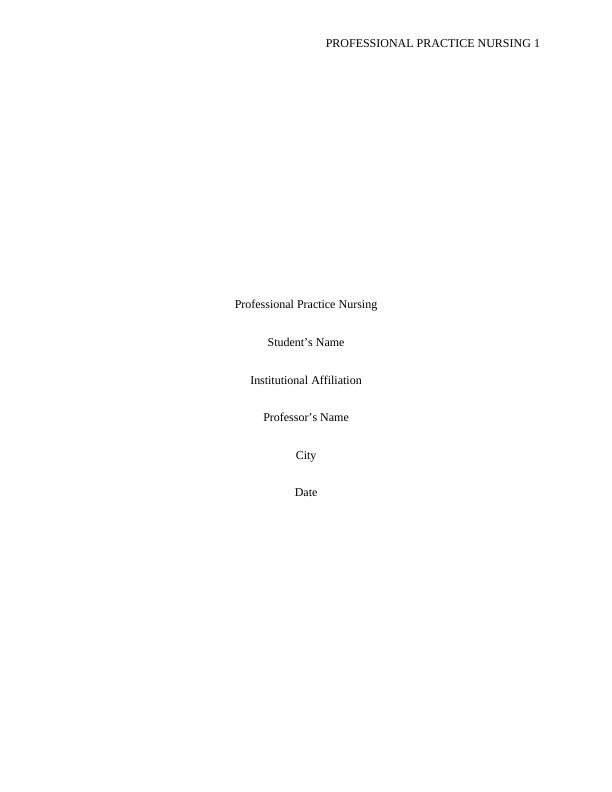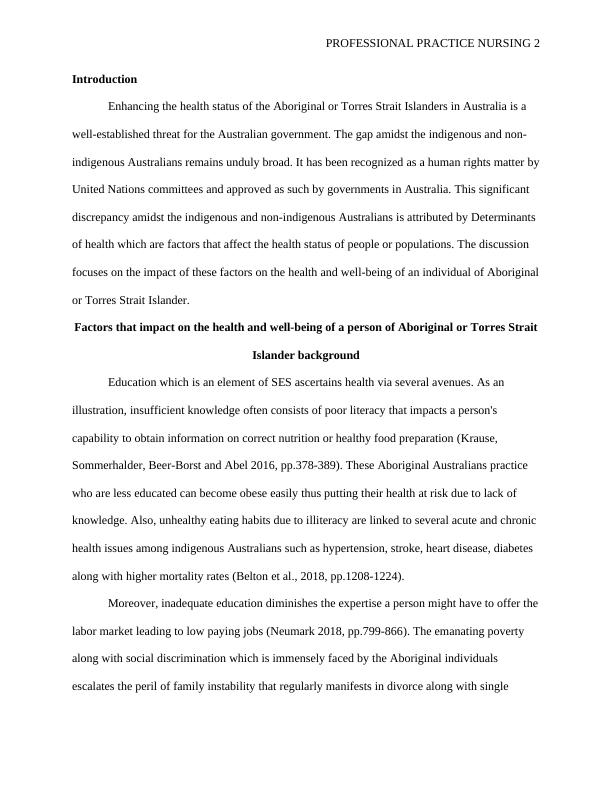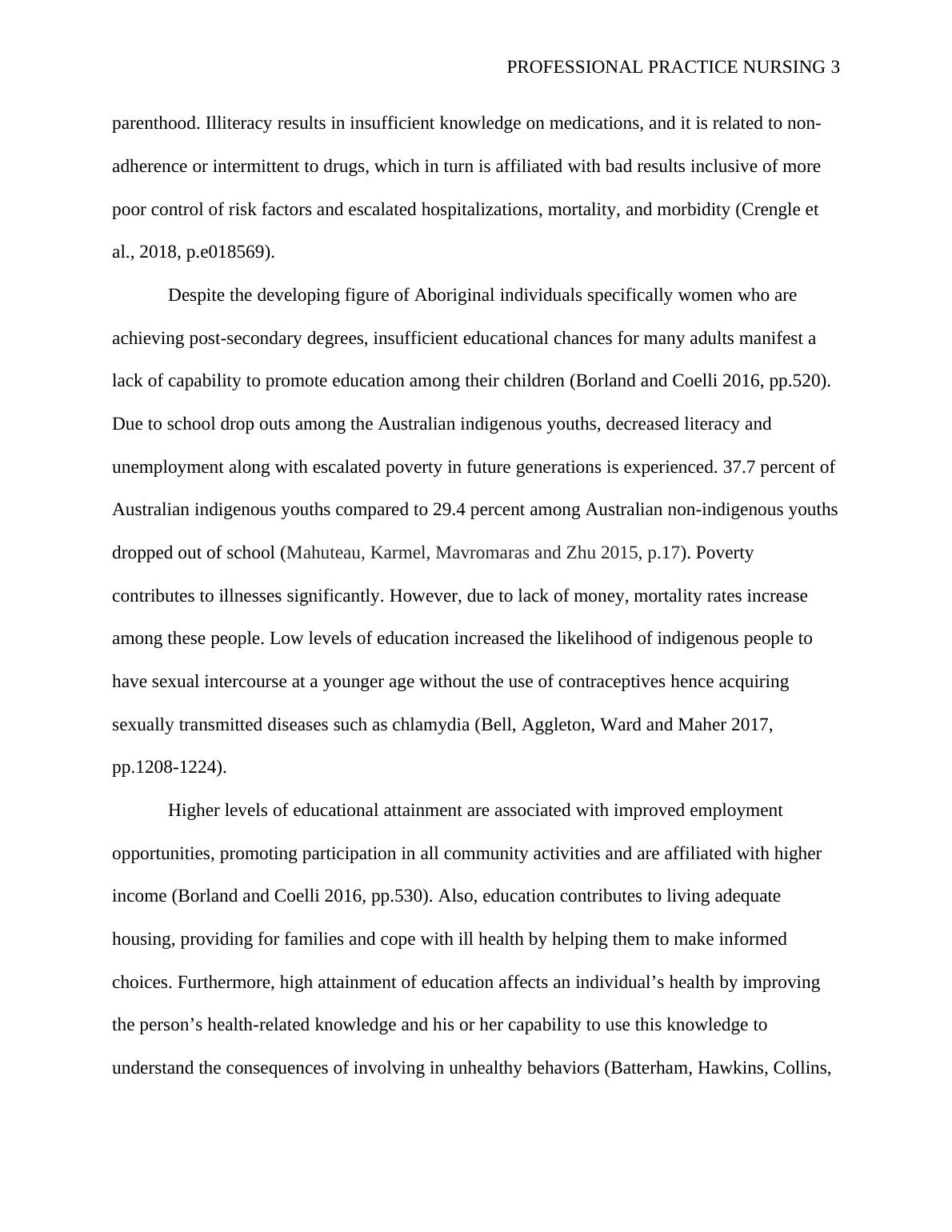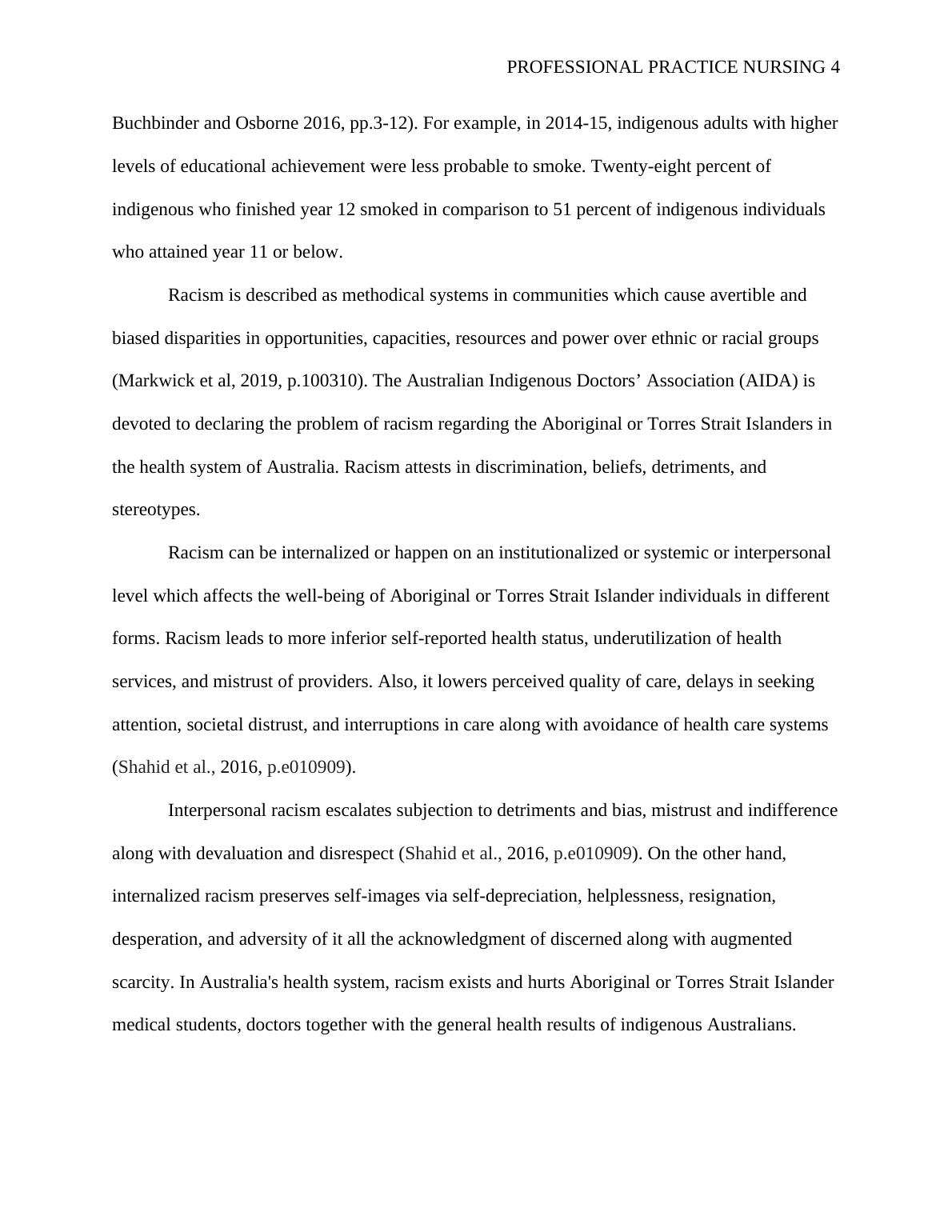Factors Impacting the Health of Aboriginal and Torres Strait Islanders
Added on 2023-01-19
11 Pages3114 Words85 Views
PROFESSIONAL PRACTICE NURSING 1
Professional Practice Nursing
Student’s Name
Institutional Affiliation
Professor’s Name
City
Date
Professional Practice Nursing
Student’s Name
Institutional Affiliation
Professor’s Name
City
Date

PROFESSIONAL PRACTICE NURSING 2
Introduction
Enhancing the health status of the Aboriginal or Torres Strait Islanders in Australia is a
well-established threat for the Australian government. The gap amidst the indigenous and non-
indigenous Australians remains unduly broad. It has been recognized as a human rights matter by
United Nations committees and approved as such by governments in Australia. This significant
discrepancy amidst the indigenous and non-indigenous Australians is attributed by Determinants
of health which are factors that affect the health status of people or populations. The discussion
focuses on the impact of these factors on the health and well-being of an individual of Aboriginal
or Torres Strait Islander.
Factors that impact on the health and well-being of a person of Aboriginal or Torres Strait
Islander background
Education which is an element of SES ascertains health via several avenues. As an
illustration, insufficient knowledge often consists of poor literacy that impacts a person's
capability to obtain information on correct nutrition or healthy food preparation (Krause,
Sommerhalder, Beer-Borst and Abel 2016, pp.378-389). These Aboriginal Australians practice
who are less educated can become obese easily thus putting their health at risk due to lack of
knowledge. Also, unhealthy eating habits due to illiteracy are linked to several acute and chronic
health issues among indigenous Australians such as hypertension, stroke, heart disease, diabetes
along with higher mortality rates (Belton et al., 2018, pp.1208-1224).
Moreover, inadequate education diminishes the expertise a person might have to offer the
labor market leading to low paying jobs (Neumark 2018, pp.799-866). The emanating poverty
along with social discrimination which is immensely faced by the Aboriginal individuals
escalates the peril of family instability that regularly manifests in divorce along with single
Introduction
Enhancing the health status of the Aboriginal or Torres Strait Islanders in Australia is a
well-established threat for the Australian government. The gap amidst the indigenous and non-
indigenous Australians remains unduly broad. It has been recognized as a human rights matter by
United Nations committees and approved as such by governments in Australia. This significant
discrepancy amidst the indigenous and non-indigenous Australians is attributed by Determinants
of health which are factors that affect the health status of people or populations. The discussion
focuses on the impact of these factors on the health and well-being of an individual of Aboriginal
or Torres Strait Islander.
Factors that impact on the health and well-being of a person of Aboriginal or Torres Strait
Islander background
Education which is an element of SES ascertains health via several avenues. As an
illustration, insufficient knowledge often consists of poor literacy that impacts a person's
capability to obtain information on correct nutrition or healthy food preparation (Krause,
Sommerhalder, Beer-Borst and Abel 2016, pp.378-389). These Aboriginal Australians practice
who are less educated can become obese easily thus putting their health at risk due to lack of
knowledge. Also, unhealthy eating habits due to illiteracy are linked to several acute and chronic
health issues among indigenous Australians such as hypertension, stroke, heart disease, diabetes
along with higher mortality rates (Belton et al., 2018, pp.1208-1224).
Moreover, inadequate education diminishes the expertise a person might have to offer the
labor market leading to low paying jobs (Neumark 2018, pp.799-866). The emanating poverty
along with social discrimination which is immensely faced by the Aboriginal individuals
escalates the peril of family instability that regularly manifests in divorce along with single

PROFESSIONAL PRACTICE NURSING 3
parenthood. Illiteracy results in insufficient knowledge on medications, and it is related to non-
adherence or intermittent to drugs, which in turn is affiliated with bad results inclusive of more
poor control of risk factors and escalated hospitalizations, mortality, and morbidity (Crengle et
al., 2018, p.e018569).
Despite the developing figure of Aboriginal individuals specifically women who are
achieving post-secondary degrees, insufficient educational chances for many adults manifest a
lack of capability to promote education among their children (Borland and Coelli 2016, pp.520).
Due to school drop outs among the Australian indigenous youths, decreased literacy and
unemployment along with escalated poverty in future generations is experienced. 37.7 percent of
Australian indigenous youths compared to 29.4 percent among Australian non-indigenous youths
dropped out of school (Mahuteau, Karmel, Mavromaras and Zhu 2015, p.17). Poverty
contributes to illnesses significantly. However, due to lack of money, mortality rates increase
among these people. Low levels of education increased the likelihood of indigenous people to
have sexual intercourse at a younger age without the use of contraceptives hence acquiring
sexually transmitted diseases such as chlamydia (Bell, Aggleton, Ward and Maher 2017,
pp.1208-1224).
Higher levels of educational attainment are associated with improved employment
opportunities, promoting participation in all community activities and are affiliated with higher
income (Borland and Coelli 2016, pp.530). Also, education contributes to living adequate
housing, providing for families and cope with ill health by helping them to make informed
choices. Furthermore, high attainment of education affects an individual’s health by improving
the person’s health-related knowledge and his or her capability to use this knowledge to
understand the consequences of involving in unhealthy behaviors (Batterham, Hawkins, Collins,
parenthood. Illiteracy results in insufficient knowledge on medications, and it is related to non-
adherence or intermittent to drugs, which in turn is affiliated with bad results inclusive of more
poor control of risk factors and escalated hospitalizations, mortality, and morbidity (Crengle et
al., 2018, p.e018569).
Despite the developing figure of Aboriginal individuals specifically women who are
achieving post-secondary degrees, insufficient educational chances for many adults manifest a
lack of capability to promote education among their children (Borland and Coelli 2016, pp.520).
Due to school drop outs among the Australian indigenous youths, decreased literacy and
unemployment along with escalated poverty in future generations is experienced. 37.7 percent of
Australian indigenous youths compared to 29.4 percent among Australian non-indigenous youths
dropped out of school (Mahuteau, Karmel, Mavromaras and Zhu 2015, p.17). Poverty
contributes to illnesses significantly. However, due to lack of money, mortality rates increase
among these people. Low levels of education increased the likelihood of indigenous people to
have sexual intercourse at a younger age without the use of contraceptives hence acquiring
sexually transmitted diseases such as chlamydia (Bell, Aggleton, Ward and Maher 2017,
pp.1208-1224).
Higher levels of educational attainment are associated with improved employment
opportunities, promoting participation in all community activities and are affiliated with higher
income (Borland and Coelli 2016, pp.530). Also, education contributes to living adequate
housing, providing for families and cope with ill health by helping them to make informed
choices. Furthermore, high attainment of education affects an individual’s health by improving
the person’s health-related knowledge and his or her capability to use this knowledge to
understand the consequences of involving in unhealthy behaviors (Batterham, Hawkins, Collins,

PROFESSIONAL PRACTICE NURSING 4
Buchbinder and Osborne 2016, pp.3-12). For example, in 2014-15, indigenous adults with higher
levels of educational achievement were less probable to smoke. Twenty-eight percent of
indigenous who finished year 12 smoked in comparison to 51 percent of indigenous individuals
who attained year 11 or below.
Racism is described as methodical systems in communities which cause avertible and
biased disparities in opportunities, capacities, resources and power over ethnic or racial groups
(Markwick et al, 2019, p.100310). The Australian Indigenous Doctors’ Association (AIDA) is
devoted to declaring the problem of racism regarding the Aboriginal or Torres Strait Islanders in
the health system of Australia. Racism attests in discrimination, beliefs, detriments, and
stereotypes.
Racism can be internalized or happen on an institutionalized or systemic or interpersonal
level which affects the well-being of Aboriginal or Torres Strait Islander individuals in different
forms. Racism leads to more inferior self-reported health status, underutilization of health
services, and mistrust of providers. Also, it lowers perceived quality of care, delays in seeking
attention, societal distrust, and interruptions in care along with avoidance of health care systems
(Shahid et al., 2016, p.e010909).
Interpersonal racism escalates subjection to detriments and bias, mistrust and indifference
along with devaluation and disrespect (Shahid et al., 2016, p.e010909). On the other hand,
internalized racism preserves self-images via self-depreciation, helplessness, resignation,
desperation, and adversity of it all the acknowledgment of discerned along with augmented
scarcity. In Australia's health system, racism exists and hurts Aboriginal or Torres Strait Islander
medical students, doctors together with the general health results of indigenous Australians.
Buchbinder and Osborne 2016, pp.3-12). For example, in 2014-15, indigenous adults with higher
levels of educational achievement were less probable to smoke. Twenty-eight percent of
indigenous who finished year 12 smoked in comparison to 51 percent of indigenous individuals
who attained year 11 or below.
Racism is described as methodical systems in communities which cause avertible and
biased disparities in opportunities, capacities, resources and power over ethnic or racial groups
(Markwick et al, 2019, p.100310). The Australian Indigenous Doctors’ Association (AIDA) is
devoted to declaring the problem of racism regarding the Aboriginal or Torres Strait Islanders in
the health system of Australia. Racism attests in discrimination, beliefs, detriments, and
stereotypes.
Racism can be internalized or happen on an institutionalized or systemic or interpersonal
level which affects the well-being of Aboriginal or Torres Strait Islander individuals in different
forms. Racism leads to more inferior self-reported health status, underutilization of health
services, and mistrust of providers. Also, it lowers perceived quality of care, delays in seeking
attention, societal distrust, and interruptions in care along with avoidance of health care systems
(Shahid et al., 2016, p.e010909).
Interpersonal racism escalates subjection to detriments and bias, mistrust and indifference
along with devaluation and disrespect (Shahid et al., 2016, p.e010909). On the other hand,
internalized racism preserves self-images via self-depreciation, helplessness, resignation,
desperation, and adversity of it all the acknowledgment of discerned along with augmented
scarcity. In Australia's health system, racism exists and hurts Aboriginal or Torres Strait Islander
medical students, doctors together with the general health results of indigenous Australians.

End of preview
Want to access all the pages? Upload your documents or become a member.
Related Documents
Closing the Gap Policy and its Impact on Aboriginal and Torres Strait Islander Healthlg...
|10
|2527
|101
Improving Healthcare Services for Aboriginal and Torres Strait Islander Peoplelg...
|12
|3146
|84
Closing The Gap (CTG) Policy and its Significance to Indigenous Australianslg...
|9
|2346
|488
Introduction to Indigenous Australialg...
|4
|797
|91
The Aboriginals Community Report 2022lg...
|15
|4033
|8
Bachelor of Nursing Healthlg...
|8
|1851
|42